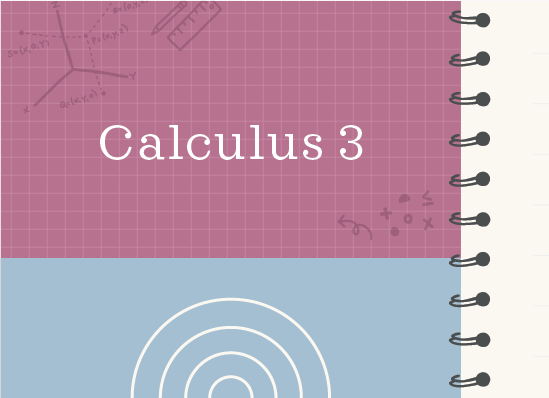How to find the integral of a vector function
The form of the integral of a vector function
To find the integral of a vector function ???r(t)=r(t)_1\bold i+r(t)_2\bold j+r(t)_3\bold k???, we simply replace each coefficient with its integral.
In other words, the integral of the vector function is
???\int r(t)\ dt=\bold i\int r(t)_1\ dt+\bold j\int r(t)_2\ dt+\bold k\int r(t)_3\ dt???
Hi! I'm krista.
I create online courses to help you rock your math class. Read more.
If the vector function is given as ???r(t)=\langle{r(t)_1,r(t)_2,r(t)_3}\rangle???, then its integral is
???\int{r(t)}=\left\langle{\int{r(t)_1}\ dt,\int{r(t)_2}\ dt,\int{r(t)_3}}\ dt\right\rangle???
How to find the integral of a vector function
Take the course
Want to learn more about Calculus 3? I have a step-by-step course for that. :)
A step-by-step example of how to find the integral of a vector function
Example
Find the integral of the vector function over the interval ???[0,\pi]???.
???r(t)=\sin{(2t)}\bold i+2e^{2t}\bold j+4t^3\bold k???
Remember that we’re only taking the integrals of the coefficients, which means ???\bold i???, ???\bold j??? and ???\bold k??? will be left alone.
???\int^{\pi}_0{r(t)}\ dt=\frac{-\cos{(2t)}}{2}\Big|^{\pi}_0\bold i+\frac{2e^{2t}}{2}\Big|^{\pi}_0\bold j+\frac{4t^4}{4}\Big|^{\pi}_0\bold k???
???\int^{\pi}_0{r(t)}\ dt=\frac{-\cos{(2t)}}{2}\Big|^{\pi}_0\bold i+e^{2t}\Big|^{\pi}_0\bold j+t^4\Big|^{\pi}_0\bold k???
To find the integral of a vector function, we simply replace each coefficient with its integral.
Evaluating over the interval ???[0,\pi]???, we get
???\int^{\pi}_0{r(t)}\ dt=\left[\frac{-\cos{(2\pi)}}{2}-\frac{-\cos{(2(0))}}{2}\right]\bold i+\left[e^{2\pi}-e^{2(0)}\right]\bold j+\left[\pi^4-0^4\right]\bold k???
???\int^{\pi}_0{r(t)}\ dt=\left[\frac{-\cos{(2\pi)}}{2}+\frac{\cos{0}}{2}\right]\bold i+\left(e^{2\pi}-1\right)\bold j+\left(\pi^4-0\right)\bold k???
???\int^{\pi}_0{r(t)}\ dt=\left(\frac{-1}{2}+\frac{1}{2}\right)\bold i+(e^{2\pi}-1)\bold j+\pi^4\bold k???
???\int^{\pi}_0{r(t)}\ dt=0\bold i+(e^{2\pi}-1)\bold j+\pi^4\bold k???
???\int^{\pi}_0{r(t)}\ dt=(e^{2\pi}-1)\bold j+\pi^4\bold k???
This is the integral of the vector function. We could also write it in the form
???\int^{\pi}_0{r(t)}\ dt=\left\langle0,e^{2\pi}-1,\pi^4\right\rangle???






